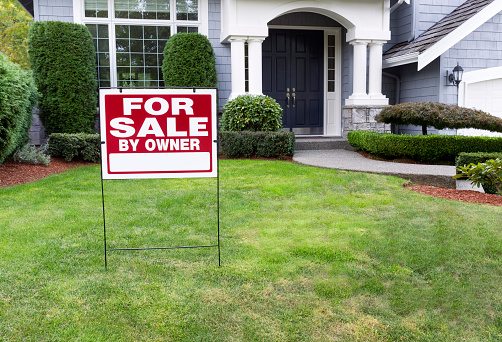It’s a question that has crossed the mind of many a homeowner looking to put their house on the market, even if only for a nanosecond: Should I sell my house without a real estate agent?
It’s a logical question. If you sell your house on your own—known in the real estate industry as an FSBO (for sale by owner)—you can avoid paying commission on the sale. But just because you can do something doesn’t mean you should and selling a house can be tricky if you’ve never done it before.
If you’re considering selling your own house and you want to know what you’re about to get into, here are some of the pros and cons of going it alone. In truth, what follows are mostly cons. Still, don’t be too discouraged—if you’re truly committed to selling your house on your own, it may be a good move for you.
Pro: You Can Save Money.
The average real estate commission is 6 percent, which can be fairly significant. A 6 percent commission on a $300,000 home, for example, is $18,000.
Granted, some will argue that you won’t save money with an FSBO. “Whenever I’ve sold a house, and I’ve looked at comparables in my area and come up with a price, my real estate agent has told me that I’m underpricing my property. If I had done it on my own, I would have lowballed myself,” says Debra Angilletta, a New York City-based business coach and a homeowner who has bought and sold several real estate properties throughout her adult life—but never without the help of an agent.
If you’re concerned about spending too much on a sales commission but are wary of doing it on your own, you can ask your real estate agent if they will reduce their fee. Or you could try a discount real estate brokerage, which offers a menu of services so you can choose what you want to pay for. For instance, you might want to pay for them to market your house, but you’ll handle the price negotiations with anyone who wants to buy it yourself.
“One really nice thing that the discount brokers provide is that you get access to the multiple listing service, so you can get your property broadly advertised,” says Ron Throupe, a real estate associate professor at the University of Denver’s Daniels College of Business.
Con: Time Is Money.
For many people, the amount of time necessary to sell their house is too much. “I don’t have the time to sell homes,” Angilletta says.
She does believe it is possible for a homeowner to sell their own house and get a good deal, “but you have to be willing to put in the time, research and effort. You have to be committed,” she says, noting that selling a home successfully requires a lot of expertise she doesn’t have…which leads us to the next negative.
Con: You Might Not Have the Knowledge Needed.
Some of the knotty issues you’ll need to fully understand involve the purchase agreements, the closing documents and, of course, any state laws tied to real estate transactions. If your state requires you to disclose a roof leak to a buyer, for instance, and you don’t, you could leave yourself open to future litigation.
And then there’s the simple fact that you might not be as objective about your home as you think you are, says Bill Golden, an independent real estate agent with RE/Max Metro Atlanta Countryside who’s been selling homes for almost 30 years.
Homeowners, Golden says, “usually have an attachment to their house that can give them blinders.” He offers up an example of a house he recently sold that had an old dog living there. “When I first went in there, the dog smell was overwhelming, but the homeowners didn’t smell it at all, because they lived there and were used to it,” he says.
“Together, we figured out the best plan to rid the house of the smell, and it ended up selling very quickly. It usually takes a trained eye, or nose, to go through the home and figure out what needs to be done in order to have it in the best shape to show.”
Con: Realtors May Not Want to Work With You.
There are two main reasons why agents might not want to work with you, says Bruce Ailion, a real estate agent and attorney also based in Atlanta. “The real estate professional often views the FSBO seller as cheap, difficult and unreasonable,” Ailion says.
Ailion knows that not all FSBO sellers are going to be a pain in the neck to work with. But enough sellers are difficult—and enough FSBO sales collapse at the last minute—that many real estate agents are reluctant to show their clients a house that is for sale by the owner.
The second reason real estate agents are reluctant to work with an FSBO seller is that they tend to ask them for a lot of advice, Ailion says.
“Most real estate professionals feel they will be doing twice the work for half the fee, as the seller will have questions and issues with the inspections, appraisals, repair resolution, contract changes, amendments and settlement that need to be addressed and resolved,” Ailion says.
All of this together means that right from the onset, many real estate agents—who represent your potential buyers—will not want to do business with you.
Con: You Could Be Swindled by a Con Artist.
You likely don’t have a lot of experience in real estate residential contracts. But a con artist might. In fact, real estate con artists sometimes turn out to be former real estate agents. Although it’s more common to be bilked when you’re buying a house (there are numerous tales of swindlers pocketing huge deposits from buyers after selling homes they don’t actually own), it’s entirely possible that you could end up signing paperwork that in effect transfers ownership to a con artist.
Even if that doesn’t happen, you could still end up giving out far more of your personal information than you would have, had you realized who you were dealing with.
In fact, in 2008, the FBI issued a warning to consumers indicating that some con artists have managed to combine both identity theft and mortgage fraud, selling both vacant homes and homes with families still living in them. That’s right: mortgage-paying homeowners have had their house sold, having no idea that one day in the near future, they would get a knock on the door from a buyer who had unwittingly purchased the home and is wondering why there are people living on the property.
Pro: You Are in Control.
This may be the best reason to consider selling your home on your own. You know yourself better than anyone, and if you really feel strongly that you can do things better than a real estate agent, and if you’re a proud control freak, maybe you will be better off.
But according to Ailion, the average real estate agent sells only four homes a year, and 50 percent of agents sell no homes.
“It isn’t as easy to do as people think,” he says of selling homes. “If it were that easy, everyone would do it.”
Interested in more tips around selling your home or moving? Find them here on Extra Mile.







Geoff Williams’ article on the pros and cons of selling your own home provides a valuable and well-rounded perspective for homeowners contemplating the FSBO route. Williams effectively highlights the potential benefits of saving on real estate commissions and maintaining control over the process. At the same time, he offers a dose of reality by underscoring the challenges that come with a lack of expertise, the risk of legal issues, and potential reluctance from realtors. This balanced view encourages readers to make informed decisions about whether selling their home without an agent is the right choice for them, and it does an excellent job of shedding light on the complexities of the real estate market. Well done!
This is an excellent blog.
A real estate agent offers experience and expertise that takes the work off of homeowners. This was a good read!
Thanks for sharing this informative blog! I was searching for a blog where I would get information about whether it’s good to sell my home on own or I need to hire a realtor. And after reading your blog I come to know that hiring a knowledgeable realtor is best deal.
This is amazing. Great article so far.
You made a good point that good negotiation can go a long way when it comes to working with a residential realtor. One of my cousins is planning to move to a different city soon after a finalizing her divorce. I think working with a real estate professional will speed up the process quite significantly.
WHAT ,,!! You pay a realtor to list your house on a computer in his office show it a few times open escrow. and then escrow takes over and handles the rest. And for this for pay 6% What a racket! No Thanks.
I like how Bill Golden said that sellers are attached to their houses and that can give them blinders when trying to list their homes on the market. My wife and I are expecting our second child, so we want to sell our current home and buy a larger one. Neither of us has gone through the process of selling a home, so it seems like it would be beneficial for us to have a professional guiding us the entire way.
Congratulations on your second child, Dean. Thank you for reading!
I really liked what you said about how it’s often better hire a real estate agent if you don’t have the time necessary to sell your home yourself. We need to move to a new state for a job I recently acquired, so my husband and I are considering how to sell our current home. Thank you for the information about how if we were to do it ourselves, we’d need to be willing to put in the time, research, and effort.
It makes sense how you said that selling real estate on your own can be difficult because you won’t have the time required. My wife and I need to sell our house quickly, but we both work and can’t leave. We’ll have to look into hiring an agent to get it all taken care of for us.
It’s great that you’ve mentioned that one can save money if they sell a home without a realtor due to the fact that they won’t have to pay commissions. My brother wants to sell his home but he wants to maximize his profit and do it without a realtor. I’ll suggest that he can do it by getting his property listed online and learn about laws so that there will be no litigation related to selling his property.